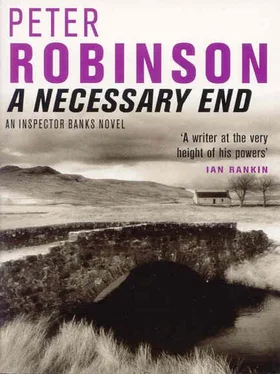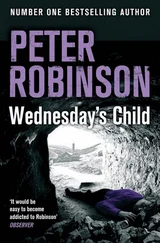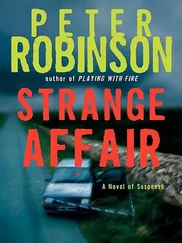Peter Robinson - A Necessary End
Здесь есть возможность читать онлайн «Peter Robinson - A Necessary End» весь текст электронной книги совершенно бесплатно (целиком полную версию без сокращений). В некоторых случаях можно слушать аудио, скачать через торрент в формате fb2 и присутствует краткое содержание. Год выпуска: 1989, ISBN: 1989, Издательство: Avon, Жанр: Полицейский детектив, на английском языке. Описание произведения, (предисловие) а так же отзывы посетителей доступны на портале библиотеки ЛибКат.
- Название:A Necessary End
- Автор:
- Издательство:Avon
- Жанр:
- Год:1989
- ISBN:9780330514729
- Рейтинг книги:5 / 5. Голосов: 1
-
Избранное:Добавить в избранное
- Отзывы:
-
Ваша оценка:
- 100
- 1
- 2
- 3
- 4
- 5
A Necessary End: краткое содержание, описание и аннотация
Предлагаем к чтению аннотацию, описание, краткое содержание или предисловие (зависит от того, что написал сам автор книги «A Necessary End»). Если вы не нашли необходимую информацию о книге — напишите в комментариях, мы постараемся отыскать её.
A Necessary End — читать онлайн бесплатно полную книгу (весь текст) целиком
Ниже представлен текст книги, разбитый по страницам. Система сохранения места последней прочитанной страницы, позволяет с удобством читать онлайн бесплатно книгу «A Necessary End», без необходимости каждый раз заново искать на чём Вы остановились. Поставьте закладку, и сможете в любой момент перейти на страницу, на которой закончили чтение.
Интервал:
Закладка:
He paused and fingered his small gold crucifix. As Banks looked at him slouching on the sofa with his long legs crossed and his arms spread out along the back, the word languid came to mind.
"Have you noticed how things seem to come in packages?" Osmond went on. "If you're anti-nuclear, people also expect you to be pro-choice, pro-union, pro-gays, anti-American, anti-apartheid and generally left wing. Most people don't realize that it's perfectly possible to be, say, anti-nuclear and anti-apartheid without being pro-gay and prochoice — especially if you're a Catholic. Oh, the permutations might differ a bit — some packages are more extreme and dangerous than others, for example — but you can pretty well predict the kind of things our members value. The point is that what we stand for is politically hot, and that draws attention to us from all sides. The government thinks we're in league with the Russians, so they raid our offices periodically and go over our files. The communists think we're allies in overthrowing a decadent capitalist government, so they woo us and infiltrate us with their own. It's a bloody mess, but we manage, through it all, to stick to our aims."
"Are you saying you think the break-in was politically motivated?"
"That's about it." Osmond lifted the Scotch bottle and raised his eyebrows.
Banks held out his glass. "And the theft of the book was a sort of calling card, or warning. So do you see what I mean about not expecting much help from the police? If Special Branch or MI5 or whoever are involved, you'd get your wrists slapped, and if it's the other side, you'd never catch them anyway."
"But what were they looking for?"
"I don't know. Anyway, I don't keep my files here. Most of the important ones are at the CND office, and some of the stuff is at work."
"The Social Services Centre?"
"Yes. I've got an office there. It's convenient."
"So they didn't find what they were looking for because they didn't look in the right place."
"I suppose so. The only current thing is the inquiry I'm making into the demo. I've already told you about that — and Superintendent Burgess, too. I've talked to quite a lot of people involved, trying to establish exactly what happened and how it could have been avoided. Tim and Abha are helping, too. They've got most of the info at their place. We're having a meeting up at the farm tomorrow to decide what to do about it all. Ever since your boss was taken off the job, we've been carrying on for him, and our results will be a hell of a lot less biased."
"You're wrong," Banks said, lighting another cigarette. "The trouble with people like you, despite all your talk about packages, is that you tar everyone with the same brush. To you, all police are pigs. Superintendent Gristhorpe would have done a good job. He wouldn't have swept it all under the carpet."
"Maybe that's why he was taken off," Osmond said. "I read in the paper that they were going to appoint an impartial investigating commission — which, I suppose, means a bunch of high-ranking policemen from somewhere other than Eastvale — but most of us think they're just going to forget about the whole embarrassing affair. Once the killer is convicted — and it looks like you're well on your way to doing that — the anti-nuke lefties will be shown up for exactly what you all think we are — a gang of murderous anarchists — and the police will gain a lot of very useful public sympathy."
Banks put his empty glass down and walked over to the window. "Tell me about Ellen Ventner."
Osmond paled. "You certainly do your homework, don't you?"
"Ellen Ventner."
"If you think I'm going to admit to those ludicrous charges against me, you must be crazy."
"Much as it saddens me to say so, I'm not here to investigate those old charges. So you like to beat up women. That's your privilege."
"You bastard. Are you going to tell Jenny?"
"I honestly don't know. Ellen Ventner didn't pursue the charges. God knows why, but a lot of women don't. Maybe she thought you were still a really sweet fellow underneath it all. But that doesn't alter what happened. You might think you're a very important man in the political scheme of things, but personally I doubt it. On the other hand, a woman you once assaulted might bear a grudge."
"After four years?"
"It's possible."
"Forget it. She wouldn't. Besides, she emigrated not long after we split up."
"I can understand why she might have wanted to get as far away from you as possible. Just checking all the angles."
Osmond glared, then looked into his glass and started to fiddle with his crucifix again. "Look, it was only the once She… I was drunk. I didn't mean to"
Banks sat down opposite him again and leaned forward. "When you made your complaint about PC Gill," he asked, "how did you do it?"
Osmond floundered. It was so easy, Banks thought. Stir up a man's emotions, then change the subject and you're in control again. He'd had enough of Osmond's lectures and his arrogance.
"What do you mean, how did I do it? I wrote a letter."
"How did you refer to him?"
"By his number. How else?"
"1139?"
"Yes, that's it."
"You still remember it?"
"Obviously."
"So how did you know his name?"
"Look, I don't—"
"When I first asked you if you knew Gill, you said no. I didn't use his number, I used his name, and you recognized it when you lied to me."
"He told me," Osmond said. "When I tried to stop him from hitting a woman at a demo once, he pulled me aside and told me to keep out of it. I told him I'd report him, and he said go ahead. When I looked at his number, he told me his name, as well. Spelled it out, in fact. The bastard was proud of what he was doing."
So Osmond defended women in public and only hit them in private. Nice guy, Banks thought, but he kept his questions factual and direct. "When you were up at Maggie's Farm on the afternoon of the demonstration, did you mention that number to anyone?"
"I don't know. I can't remember."
"Think. Did you write it in a notebook, or see it written in a notebook?"
"No, I'd remember something like that. But I might have mentioned it. Really, I can't say."
"How might you have mentioned it? Just give me a sense of context."
"I might have said, 'I wonder if that bastard PC 1139 will be out tonight.' I suppose I'd have warned people about him. Christ, you can't be involved in demos around this part of the world and not know about PC bloody 1139."
"So I gather." Banks remembered what Tim and Abha had told him.
There was nothing more to ask. Banks said good night and Osmond slammed the door behind him. In the corridor, he decided to try the flats on that floor to see if anyone had noticed the housebreaker. There were only ten-five on each side. At the third door, a man who had been nipping out to the off — licence at about a quarter to eight said he'd seen two men walking along the corridor on his way back. They had seen him, too, but had made no move to run off or turn away. The description was average — most people are about as observant as a brick wall, Banks had discovered over the years — but it helped.
They were both tall and burly, and they both wore dark — blue pants, a bit shiny, probably the bottom part of a suit; one had on a black overcoat, fake leather, while the other wore a light trench coat; one had black hair, the other none at all; and neither wore a hat or glasses. About facial features, the man remembered nothing except that both men had two eyes, a nose, a mouth, and two ears. They had walked confidently and purposefully, as if they knew where they were going and what they were about, not furtively, as he imagined criminals would have done. So, no, he hadn't seen any need to call the police. He was sorry now, of course. His speech was slurred, as if he'd already drunk most of what he'd bought at the off-licence. Banks thanked him and left.
Читать дальшеИнтервал:
Закладка:
Похожие книги на «A Necessary End»
Представляем Вашему вниманию похожие книги на «A Necessary End» списком для выбора. Мы отобрали схожую по названию и смыслу литературу в надежде предоставить читателям больше вариантов отыскать новые, интересные, ещё непрочитанные произведения.
Обсуждение, отзывы о книге «A Necessary End» и просто собственные мнения читателей. Оставьте ваши комментарии, напишите, что Вы думаете о произведении, его смысле или главных героях. Укажите что конкретно понравилось, а что нет, и почему Вы так считаете.












